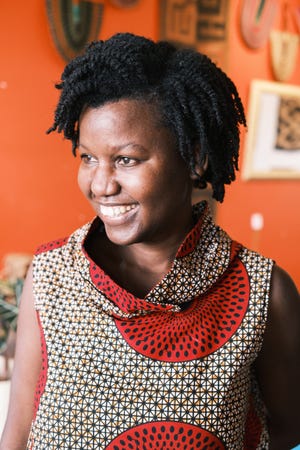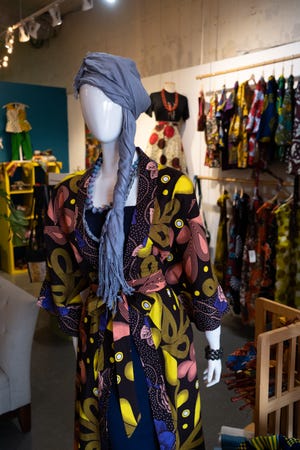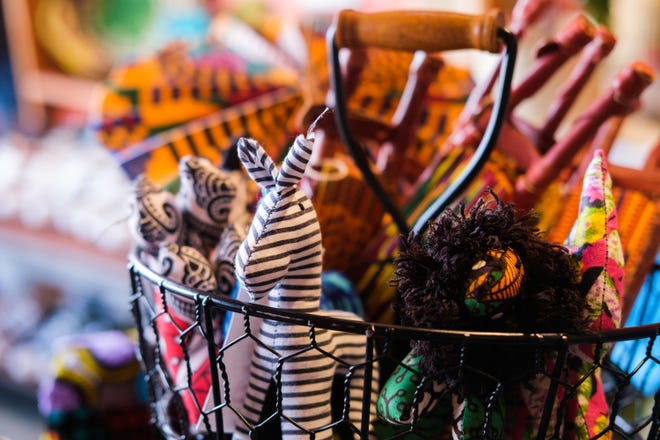There was a time when Grace Byeitima, owner of Mbabazi House of Style, was interested in lawyering, not pattern layouts.
But her mother forced her to learn about the latter.
“I wanted to be a lawyer,” said Byeitima, who is from Kampala, Uganda. “My mother was a teacher in a vocational training institute, and she made me go where she was teaching and learn how to sew.
“I went grudgingly, but I went anyway.”
Yet today Byeitima, 43, who has sold African-inspired garments, jewelry and other knickknacks from her shop in the Broad Avenue Arts District since 2017, is grateful that her mother insisted that she learn how to sew.

That’s because it not only has allowed her to craft a life of independence for herself, but for other women who want to use entrepreneurship to escape jobs which devalue them.
Which is what Byeitima aimed to do back in Kampala.
She said one of the ways that her mother endeared her to sewing was by bringing home unfinished sewing work – and paying her and her siblings to finish it.
“Some of the pieces, like what you’re seeing right now, is patchwork,” said Byeitima, as she pointed to ruby, saffron and black cowl neck shift that she was wearing.

“I would make sure that I left school on time to work on it [patchwork clothing] so that I could use the sewing machine [first].”
But when her mother was ultimately laid off from her job, that dashed Byeitima’s hopes of attending college and studying law. On top of that, Byeitima, who was 16, learned that she was pregnant.
“So, I have this baby, my mom has no job, and I have this baby to take care of,” she said.
Tonyaa’s latest:Together, the Houston High students and Memphis’ struggling youths, can boost transit|Weathersbee
It wasn’t long before Byeitima learned that she was more a target for exploitation than employment.
“I realized no one would hire you if you have a lot of baggage, and I had a baby,” she said. “The simple jobs I could have gotten would have been as secretary or a receptionist. But you’d go to apply for these jobs, and men would want to sleep with you.”
“As I looked for jobs, I found that people don’t want to pay you what you’re worth…”

But soon, Byeitima began crafting a way out.
Literally.
She began sewing garments for her baby daughter and taking the child from store to store to model them. That helped her land a year’s apprenticeship at a textile workshop that one of her mother’s former bosses owned.
“That’s where I learned actually most of what I know now, like pattern cutting and drafting and all of that,” Byeitima said.
In the meantime, she said, her mother opened a bridal shop and together, they opened Mbabazi House of Style – Mbabazi means grace or kindness in Ugandan – in Kampala in 2005.
Mbabazi is also Byeitima’s mother’s name – Mbabazi Loy Rujumba.
“The business was thriving, because I was making African print cool for younger generations,” Byeitima said. “I was working for a lot of the embassies, doing a lot of their furnishings and everything else. We were known in the expat community for doing really creative work…”
Yet Byeitima was doing more than making money. She was trying to help other women make a better way for themselves.
“We began training women in sewing skills and offering them jobs. I still work with my mom on that,” she said.
“It grew into something bigger than just me…no girl with skills should have to beg for a job if they can work for themselves, and no girl should be compromised [sexually] to get a job…”

“I started it for me, to look out for myself and my baby, but then it evolved into a social business as well.”
More from Tonyaa:This Thanksgiving, I’m grateful for the Greenway’s gifts – and the kitten among them | Weathersbee
Change continued for Byeitima.
In 2011, she met John Haley, a Memphian who was working for a Non-Governmental Organization – organizations which provide services or push for policies but are unaffiliated with any government – in Uganda. They married in 2014, and she moved with him to Memphis.
“I never dreamt of being in another country, but I knew I would fall in love with Memphis,” Byeitima said. “The trees, my God, there were so many trees…I’m from Africa, and when we see trees it’s in the forest…
“I just fell in love with the city…we went to a concert at Levitt Shell, and I have never seen so many people in one place just enjoying music. And I love music.”
Byeitima fell in love with Broad Avenue after her mother-in-law took her there. That’s when she began to get ideas for a store there.
But not without the urging of her mother.
“My mom was like: ‘You’ve been in the U.S. since 2014 and you haven’t opened a store?’ I was like, ‘This woman is crazy. She thinks this is easy…”
So, Byeitima did what she learned how to do when she took her baby from shop to shop in Kampala to show her designs.
She took baby steps.
Byeitima introduced her fashions in a pop-up shop on Broad in 2015, during the water tower lighting ceremony. And they were a hit.
“You know how you do something, and just your friends come, and your family come?” she said. “Well, this was different…a lot of people came…one lady came and spent $300.”
“I’m like, ‘Oh my God…that’s so much money.’”
So, in 2016, Byeitima opened her shop in a small room on Broad and expanded in 2017 to the current space.
To walk inside is to be transported to a place where fashion is about artistry, function and Africa. Hammered gold, oblong earrings dangle beside burgundy triangles, while skirts, scarves and dresses bear prints that are reminiscent of the savannas, the flora and the sunsets of Africa.
And, of course, there are the gold bracelets and earrings designed with the shape of the continent.
“All the clothes are made in house,” Byeitima said. “The workmanship is the lure…we prewash the fabric, and we assure that the quality is good.”
But the Broad Avenue store is a start. Byeitima said her next project is a store on wheels, and pop-up stores in different locations.
While COVID-19 forced her to close the store in Uganda, Byeitima said shultimately, she wants to have five stores in the U.S.
She also wants to keep helping women to become their own bosses – and to help immigrants and refugees get connected.
“I’ve been empowering people in the ways that I know, giving advice and training,” Byeitima said. “This young lady I know, her mother sews…
“I said, ‘Put her work on Etsy. We can sell it here.’”
Mbabazi House of Style is at 2553 Broad Avenue, Memphis, 38112. Hours: 10 a.m. to 5 p.m. Monday; 10 a.m. to 6 p.m. Tuesday through Friday; 10 a.m. to 5 p.m. Saturday and closed on Sunday. Phone: 901-303-9347 Website: https://mbabazistyles.com/
Tonyaa Weathersbee can be reached at [email protected] and you can follow her on Twitter: @tonyaajw
https://www.commercialappeal.com/story/news/2021/12/09/memphis-african-fashion-shop-grew-womans-yen-empowerment/8839243002/
 fashion rec fashion wanted
fashion rec fashion wanted
